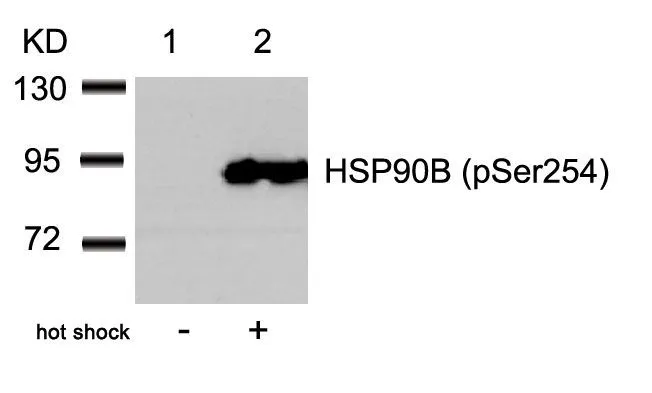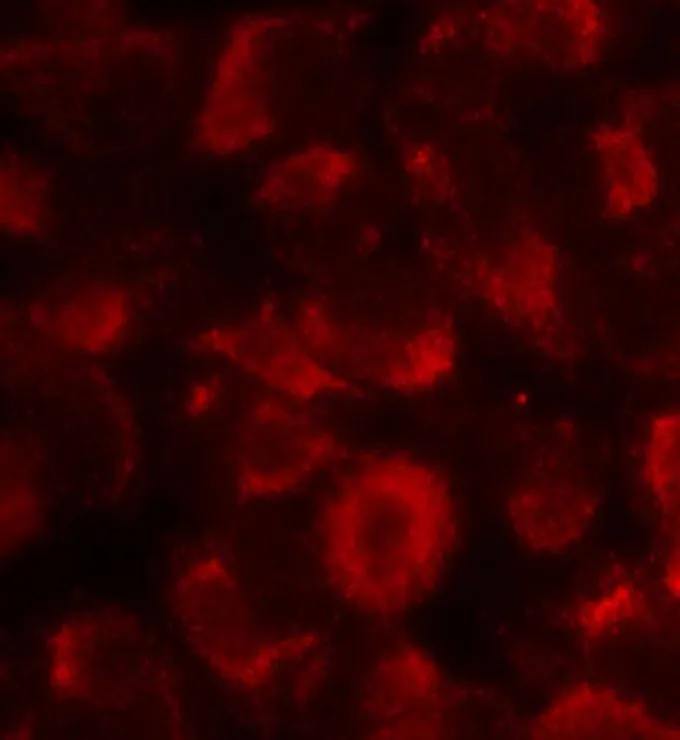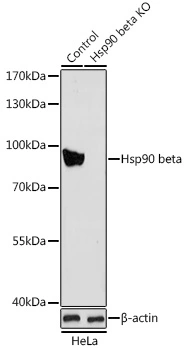![ELISA analysis of antigen using GTX60459 HSP90 beta antibody [1D9]. Red : Control antigen 100ng Purple : Antigen 10ng Green : Antigen 50ng Blue : Antigen 100ng ELISA analysis of antigen using GTX60459 HSP90 beta antibody [1D9]. Red : Control antigen 100ng Purple : Antigen 10ng Green : Antigen 50ng Blue : Antigen 100ng](https://www.genetex.com/upload/website/prouct_img/normal/GTX60459/GTX60459_20170912_ELISA_w_23061123_638.webp)
ELISA analysis of antigen using GTX60459 HSP90 beta antibody [1D9]. Red : Control antigen 100ng Purple : Antigen 10ng Green : Antigen 50ng Blue : Antigen 100ng
Hsp90 beta antibody [1D9]
GTX60459
ApplicationsWestern Blot, ELISA, ImmunoHistoChemistry, ImmunoHistoChemistry Paraffin
Product group Antibodies
ReactivityHuman, Monkey, Mouse, Rat
TargetHSP90AB1
Overview
- SupplierGeneTex
- Product NameHsp90 beta antibody [1D9]
- Delivery Days Customer9
- Application Supplier NoteWB: 1/500 - 1/2000. IHC-P: 1/200 - 1/1000. ELISA: 1/10000. *Optimal dilutions/concentrations should be determined by the researcher.Not tested in other applications.
- ApplicationsWestern Blot, ELISA, ImmunoHistoChemistry, ImmunoHistoChemistry Paraffin
- CertificationResearch Use Only
- ClonalityMonoclonal
- Clone ID1d9
- ConjugateUnconjugated
- Gene ID3326
- Target nameHSP90AB1
- Target descriptionheat shock protein 90 alpha family class B member 1
- Target synonymsD6S182, HSP84, HSP90B, HSPC2, HSPCB, heat shock protein HSP 90-beta, HSP90-beta, heat shock 84 kDa, heat shock 90kD protein 1, beta, heat shock protein 90 kDa, heat shock protein 90kDa alpha (cytosolic), class B member 1, heat shock protein 90kDa alpha family class B member 1, heat shock protein family C member 3
- HostMouse
- IsotypeIgG1
- Protein IDP08238
- Protein NameHeat shock protein HSP 90-beta
- Scientific DescriptionThis gene encodes a member of the heat shock protein 90 family; these proteins are involved in signal transduction, protein folding and degradation and morphological evolution. This gene encodes the constitutive form of the cytosolic 90 kDa heat-shock protein and is thought to play a role in gastric apoptosis and inflammation. Alternative splicing results in multiple transcript variants. Pseudogenes have been identified on multiple chromosomes. [provided by RefSeq, Dec 2012]
- ReactivityHuman, Monkey, Mouse, Rat
- Storage Instruction-20°C or -80°C,2°C to 8°C
- UNSPSC12352203

![IHC-P analysis of prostate cancer tissue (left) and lung cancer tissue (right) using GTX60459 HSP90 beta antibody [1D9]. IHC-P analysis of prostate cancer tissue (left) and lung cancer tissue (right) using GTX60459 HSP90 beta antibody [1D9].](https://www.genetex.com/upload/website/prouct_img/normal/GTX60459/GTX60459_20170912_IHC-P_w_23061123_726.webp)
![WB analysis of Jurkat (1), A431 (2), HeLa (3), A549 (4), HEK293 (5), K562 (6), NIH3T3 (7), PC-12 (8) and Cos7 (9) cell lysate using GTX60459 HSP90 beta antibody [1D9]. WB analysis of Jurkat (1), A431 (2), HeLa (3), A549 (4), HEK293 (5), K562 (6), NIH3T3 (7), PC-12 (8) and Cos7 (9) cell lysate using GTX60459 HSP90 beta antibody [1D9].](https://www.genetex.com/upload/website/prouct_img/normal/GTX60459/GTX60459_20170912_WB_w_23061123_762.webp)


![WB analysis of various samples using GTX80036 Hsp90 beta antibody [MBH90B].](https://www.genetex.com/upload/website/prouct_img/normal/GTX80036/GTX80036_20191028_WB_1_w_23061322_194.webp)
![WB analysis of various cell lines using GTX84342 HSP90 beta antibody [4C10]. Loading : 35 ug per lane](https://www.genetex.com/upload/website/prouct_img/normal/GTX84342/GTX84342_4293_WB_w_23061420_171.webp)
![ELISA analysis of antigen using GTX60458 HSP90 beta antibody [5G4]. Red : Control antigen 100ng Purple : Antigen 10ng Green : Antigen 50ng Blue : Antigen 100ng](https://www.genetex.com/upload/website/prouct_img/normal/GTX60458/GTX60458_20170912_ELISA_w_23061123_197.webp)


![ICC/IF analysis of C6 cells using GTX09012 Hsp90 beta antibody [GT1164]. Orange: Primary antibody Blue: DAPI](https://www.genetex.com/upload/website/prouct_img/normal/GTX09012/GTX09012_20191101_AP_002_89_w_23053123_626.webp)